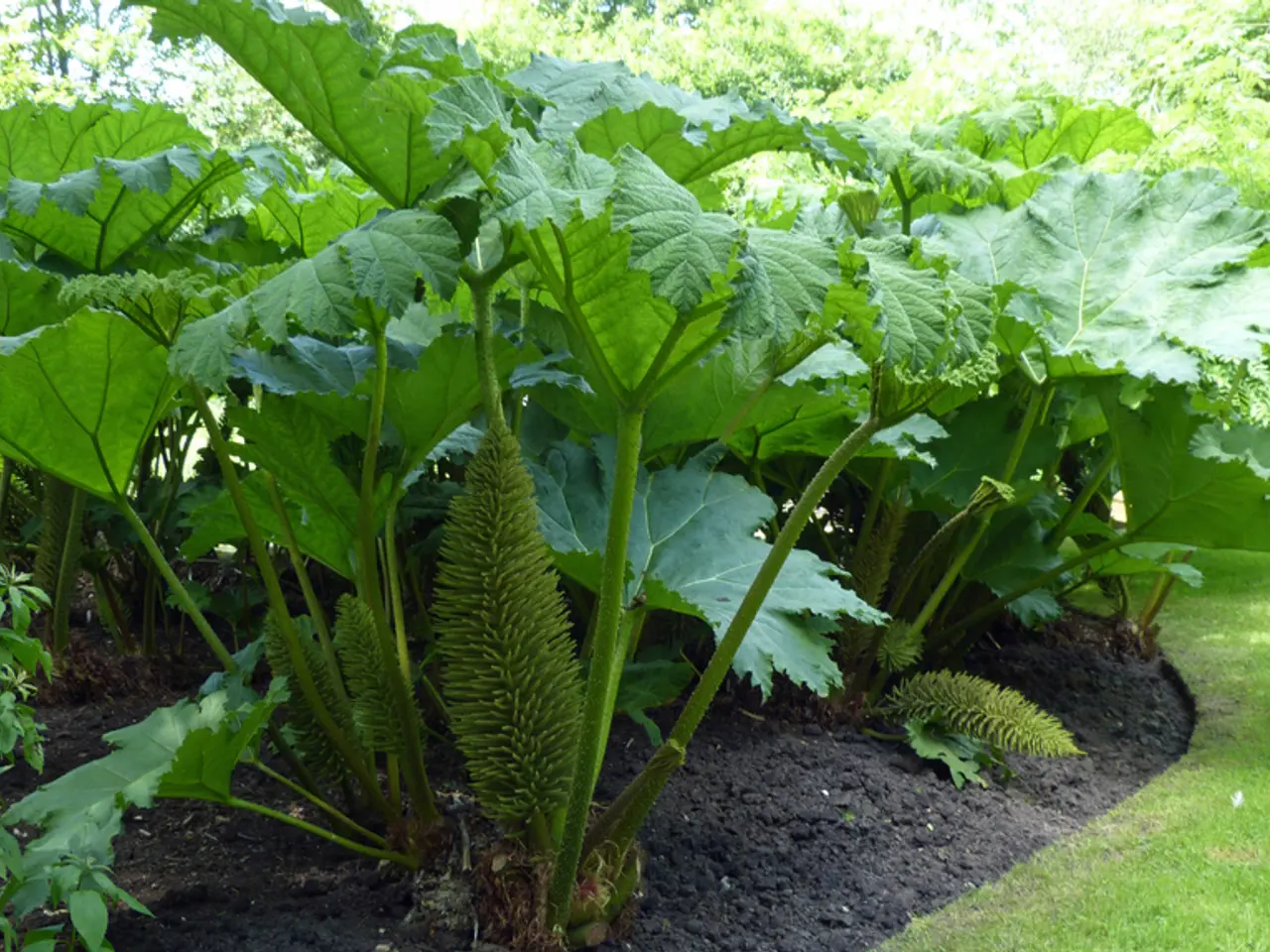Revealing the Mysteries of Soil and Plants: Uncovering the Hidden Wonders of the Natural World
Soil and Plant Scientists: The Unsung Heroes of Sustainable Agriculture
Soil and plant scientists, often referred to as agronomists, play a pivotal role in the world of agriculture and environmental sustainability. Their work is instrumental in improving soil health, crop production, and ecosystem management.
These scientists delve into the intricacies of soil properties, origins, and distribution to ensure soil fertility and recommend suitable plants for optimal yield. They meticulously study soil responses to different farming practices and environmental factors, innovating and enhancing agricultural productivity and sustainability [1].
One of their key responsibilities is understanding soil formation, stability, moisture management, and the effects of contaminants like waste on soil quality [1]. This knowledge allows them to develop strategies for remediation of contaminated soils, ensuring the health of our agricultural lands.
In their role as advisors, soil and plant scientists provide farmers and landowners with valuable information and recommendations about soil and plant conditions. They promote best land-use practices that encourage crop growth and long-term soil sustainability [1]. These practices include cover cropping, crop rotation, efficient water and nutrient management, organic farming, and soil-health monitoring, all of which contribute to resilience against drought, extreme weather, pests, and diseases [2][3].
Their work extends beyond the farm, as they contribute to environmental protection by supporting practices that reduce soil erosion, improve nutrient recycling, lower carbon emissions, prevent water pollution, and preserve biodiversity and natural habitats related to agriculture [2]. They collaborate with farmers, agronomists, and other stakeholders to develop adaptive strategies that address challenges like drought, reduced land and water availability, and climate change impacts [3].
Soil and plant scientists also engage in research and development, creating new genetic variations by making targeted crosses between selected plants [4]. They identify genetically superior individuals through multi-year and multi-location testing, and employ various techniques such as genetic engineering, selective breeding, and hybridization to develop new or improved crop varieties [4]. The most promising varieties are then registered and evaluated through field trials before being released to farmers [4].
In essence, soil and plant scientists are essential to developing sustainable agricultural systems that maintain soil vitality, enhance food security, and protect environmental resources for future generations [1][2][3][5]. Their collaboration with environmental agencies, landowners, and farmers is crucial in creating soil conservation plans, implementing improved crop varieties, and optimizing production techniques. Their work is a testament to the power of science in preserving our planet and ensuring a sustainable future for all.
[1] Soil and Plant Science Society of America. (n.d.). About Soil and Plant Sciences. Retrieved from https://www.spsa.org/about/
[2] United Nations Food and Agriculture Organization. (n.d.). Soil health. Retrieved from https://www.fao.org/soils-for-food/soils-for-life/en/
[3] United States Department of Agriculture. (n.d.). Soil Health. Retrieved from https://www.usda.gov/topics/soil-health
[4] International Union of Soil Sciences. (n.d.). What is Soil Science? Retrieved from https://www.iuss.org/what-is-soil-science/
[5] European Union. (n.d.). The importance of soil for food security and nutrition. Retrieved from https://ec.europa.eu/info/food-farming-fisheries/food-safety/food-chain-safety/soil-food-safety_en
- Science plays a crucial role in various aspects of health and wellness, including soil health, as studied by soil and plant scientists.
- Workplace-wellness programs often incorporate medical-conditions management, chronic diseases prevention, and cancer screenings.
- The relationship between respiratory conditions and air quality is a concern addressed by environmental science, particularly in urban areas.
- Digestive-health issues can be managed through dietary adjustments and therapies-and-treatments, as suggested by healthcare professionals.
- Regular check-ups and screenings are essential for maintaining eye-health, especially for people with a family history of eye-related medical conditions.
- Hearing tests and the use of hearing aids are common solutions for those suffering from hearing loss, ensuring better communication and quality of life.
- Health-and-wellness fads often involve fitness-and-exercise routines, yoga, meditation, or alternative healing methods like acupuncture.
- Sexual-health concerns can be managed through education, preventive measures, and treatment options, such as birth control, STD testing, and counseling.
- Autoimmune-disorders like rheumatoid arthritis and lupus require careful management and medications to prevent flare-ups and minimize symptoms.
- Climate change affects more than just the environment; it has implications for men's health, particularly related to cardiovascular diseases and heat-related illnesses.
- Skin-care regimens can help maintain youthful-looking skin and address skin-conditions like acne, wrinkles, or eczema.
- Therapies-and-treatments for various health conditions, from cancer to neurological disorders, are constantly evolving through research and innovation in the medical industry.
- A balanced diet rich in fruits, vegetables, and whole grains contributes to nutrition and helps maintain good health and longevity during aging.
- Women's health encompasses issues like menstrual-health, pregnancy, and gynecological care, as well as breast cancer screenings and hormone-related disorders.
- Parenting involves teaching children about personal hygiene, nutrition, and emotional well-being, as well as managing children's medical-conditions and supporting their health-and-wellness needs.
- Weight-management can be achieved through a combination of exercise, nutritious eating, and maintaining a healthy lifestyle.
- Cardiovascular-health is essential for overall health and longevity, and can be improved through a balanced diet, regular exercise, and managing high blood pressure and cholesterol levels.
- Awareness of the impact of climate change on our planet is increasing in the finance industry, with many investors seeking opportunities in clean technologies and sustainable businesses.
- Medicare offers various health services and benefits to eligible individuals, including coverage for preventive screenings and treatments like home health care, durable medical equipment, and hospice care.
- The rise of neurological-disorders like Alzheimer's and Parkinson's has led to increased research and development in neuroscience.
- Environmental science investigates the link between neurological disorders and environmental factors like pollution and radiation exposure.
- Fitness-and-exercise routines can help manage stress levels and improve mental well-being, contributing to overall health and personal-growth.
- Skin-conditions like acne and psoriasis can be managed through topical treatments, dietary changes, or medications prescribed by dermatologists.
- The study of space-and-astronomy offers fascinating insights into the universe, but also raises questions about health concerns for astronauts, such as exposure to cosmic radiation and bone density loss in low-gravity environments.
- Cybersecurity is a crucial aspect of privacy and financial well-being, as it protects sensitive information from cyber-attacks and identity theft.
- Aesthetics and sustainability are growing concerns in fashion-and-beauty, as consumers become more mindful of the environmental impact of their lifestyle choices.
- The food-and-drink industry is adapting to changing consumer preferences, offering healthier options, sustainable packaging, and transparent labeling to promote wellness and environmental responsibility.




